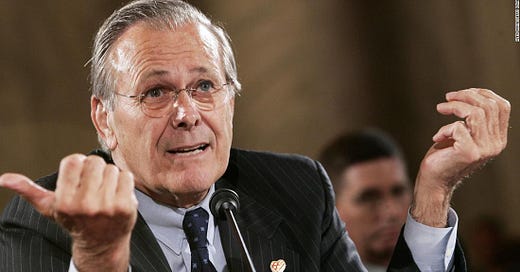"There are known knowns... But there are also unknown unknowns – the ones we don’t know we don’t know."
Donald Rumsfeld
"There are known knowns... But there are also unknown unknowns – the ones we don’t know we don’t know."
Donald Rumsfeld
This famous quote comes from Donald Rumsfeld, born on July 9, 1932. Rumsfeld was a U.S. politician and Secretary of Defense under two administrations, first in the 1970s under President Gerald Ford and later from 2001 to 2006 under President George W. Bush. He was a key figure during the early years of the Iraq War, and this particular quote gained significant attention during a 2002 press briefing about the uncertainty surrounding Iraq's alleged weapons of mass destruction (WMDs).
Rumsfeld’s quote, "There are known knowns... But there are also unknown unknowns – the ones we don’t know we don’t know," is often cited for its philosophical reflection on uncertainty and complexity in decision-making, particularly in military and governmental contexts. He broke it down into three parts:
Known knowns—things we are aware of and understand;
Known unknowns—things we are aware we don't fully understand or have incomplete knowledge about;
Unknown unknowns—things we are completely unaware of, where the gaps in knowledge are so vast that we don’t even know they exist.
The meaning of the quote addresses the complexities and challenges in making decisions with incomplete information. Rumsfeld was explaining that in any situation, particularly one as high-stakes as war, there are elements that can be anticipated, but there are also unpredictable factors that could arise unexpectedly. The "unknown unknowns" represent those unforeseen variables that, by their nature, are impossible to predict or prepare for until they emerge.
This concept is valuable not only in politics or military strategy but also in many areas of life. It speaks to the inherent uncertainty in planning and decision-making, reminding us that while we can prepare for some risks (the "knowns"), there are always unforeseen factors (the "unknowns") that might complicate outcomes. It encourages humility and adaptability when confronting the unknown, as not all situations can be fully understood or anticipated.
Rumsfeld’s words, although initially intended for a specific political moment, have since transcended into broader discussions of risk management, project planning, and strategic thinking, becoming a notable reflection on the limits of knowledge and control.





